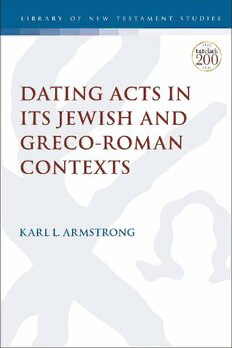
Dating Acts in Its Jewish and Greco-Roman Contexts PDF
247 Pages·2021·22.449 MB·English
Most books are stored in the elastic cloud where traffic is expensive. For this reason, we have a limit on daily download.
Preview Dating Acts in Its Jewish and Greco-Roman Contexts
Description:
Karl Armstrong addresses the long-established scholarly debate surrounding the precise dating of Acts, arguing that a historiographical approach offers a stronger framework for evaluating primary and secondary sources. With the additional support of modern principles of textual criticism and linguistics, he suggests the historical context of Acts can be determined to be concurrent with a date of 62-63 CE. Armstrong also examines the much-neglected issue of Acts and its sources, claiming there is no clear evidence that Luke used Paul’s letters or the writings of Josephus, which (in concert with other evidence) effectively removes the plausibility of a late date.Additionally, Armstrong posits that the relationship between the date of Acts, and the various interpretations on the end of the text, demonstrate that many modern and more recent theories are not only assumptive (especially with regards to genre), but in some cases utilize anachronistic literary methods. Armstrong proposes that the ancient interpretation - that Luke wrote no more because he simply knew no more - remains the most logical in light of the combined literary and historical evidence. He provides further strength to this interpretation by placing Acts in its Jewish and Greco-Roman historical context. This interpretation is further strengthened by a study of the variants at the end of Acts, capitalizing on numerous events mentioned in its climax that strongly indicate a pre-64 CE state of affairs.
See more
The list of books you might like
Most books are stored in the elastic cloud where traffic is expensive. For this reason, we have a limit on daily download.
